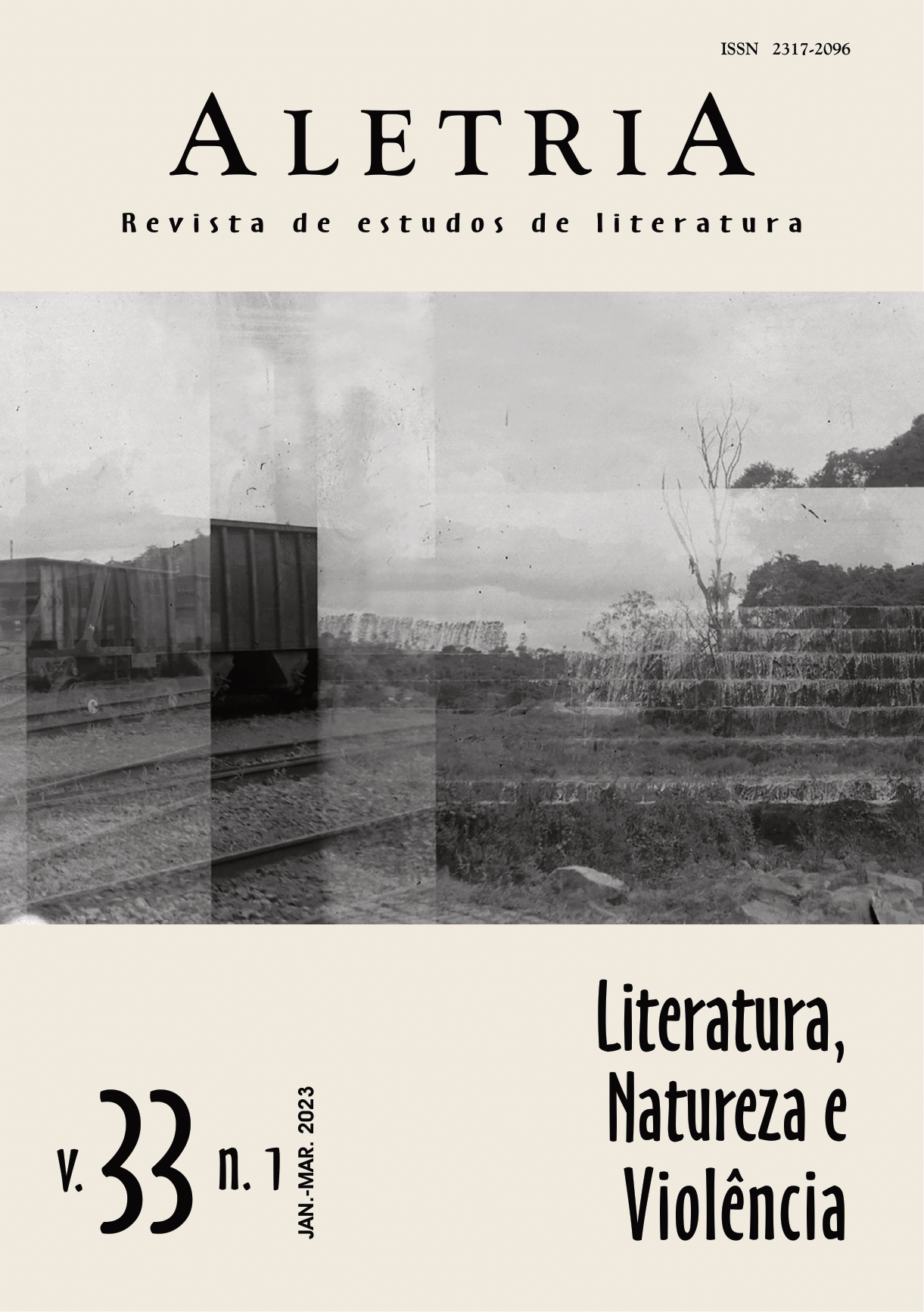"Estallar el silencio"
figurações do feminino nos olhares sobre a história
DOI :
https://doi.org/10.35699/2317-2096.2023.41880Mots-clés :
romance histórico, mulher e literatura, Margarita Carrera, Rosibel Morera, Rosario AguilarRésumé
Este artigo se propõe a analisar as figurações do feminino em três romances históricos do período pós-guerra centro-americano: La niña blanca y los pájaros sin pies, da nicaraguense Rosario Aguilar (1992); En la mirilla del Jaguar, da guatemalteca Margarita Carrera (2002); e A pesar de mujer, da costa-riquenha Rosibel Morera (2004). Para tanto, à luz de leituras que associam a questão do gênero à colonialidade, são abordados os temas da vinculação do feminino ao âmbito do privado, da relação entre mulher, saber e poder, e da noção de pedagogia do feminino como dispositivo da biopolítica. Considerando a necessária relação da história com o presente e enquanto condição de projeção do porvir, reflete-se sobre a perspectiva de futuro que é possível entrever nos romances analisados.
Téléchargements
Références
AGUILAR, Rosario. La niña blanca y los pájaros sin pies. Managua: Editorial Nueva Nicaragua, 1992.
CALVO, Yadira. La aritmética del patriarcado. San José, CR: Uruk Editores, 2013.
CARRERA, Margarita. En la mirilla del Jaguar: biografía novelada de Monseñor Gerardi. Ciudad de Guatemala: Fondo de Cultura Económica, 2002.
FOUCAULT, Michel. A microfísica do poder. Organização e tradução de Roberto Machado. Rio de Janeiro: Edições Graal, 1979.
GRINBERG PLA, Valeria; MACKENBACH, Werner. La (re)escritura de la historia en la narrativa centroamericana. In: LEYVA, Héctor M.; MACKENBACH, Werner; FERMAN, Claudia (ed.). Hacia una historia de las literaturas centroamericanas v.IV: Literatura y compromiso político. Prácticas político-culturales y estéticas de la revolución. Ciudad de Guatemala: F&G Editores, 2018.
ISTARÚ, Ana. Palabras de histérica. In: CALVO FAJARDO, Yadira (ed.). Ni miel ni hojuelas: Escribir desde la feminidad. Antología. San José, CR: Editorial Universidad de Costa Rica, 2021.
KASCHAK, Ellyn. Los llantos de la Antígona: la epistemología y la psicología de género. San José, CR: Uruk Editores, 2020.
LOBO, Tatiana. Asalto al paraíso. San José: Editorial Universidad de Costa Rica, 1992.
LUGONES, María. Colonialidad y Género. Tabula Rasa, Bogotá, n. 9, p. 73-101, jul./dez., 2008. DOI: https://doi.org/10.25058/20112742.340. Disponível em: https://www.revistatabularasa.org/numero09/colonialidad-y-genero/. Acesso em: 25 jan. 2023.
LUGONES, María. Rumo a um feminismo descolonial. Revista Estudos Feministas, Florianópolis, v. 22, n. 3, p. 935-952, set./dez., 2014. DOI: https://doi.org/10.1590/%25x. Disponível em: https://periodicos.ufsc.br/index.php/ref/article/view/36755. Acesso em 26 jan. 2023.
MACKENBACH, Werner. Literatura, memória e história en Centroamérica. Ivs Fvgit, Revista de Cultura Jurídica, Zaragoza, n. 19, p. 354-358, 2016. Disponível em:https://dialnet.unirioja.es/servlet/articulo?codigo=5979978. Acesso: 26 jan. 2023.
MEZA MÁRQUEZ, Consuelo. Utopía y compromiso: relatos de vida de seis narradoras centroamericanas. In: MEZA MÁRQUEZ, Consuelo (Coord.). Aportaciones para una historia de la literatura de mujeres de América Central. Aguascalientes, MX: Universidad Autónoma de Aguascalientes, 2009. p. 173-231.
MORERA, Rosibel. A pesar de mujer. La aventura de la transgresión. Heredia: EUNA, 2004.
ORTIZ WALLNER, Alexandra. El arte de ficcionar: la novela contemporánea en Centroamérica. Madrid: Iberoamericana; Frankfurt: Vervuert, 2012a.
ORTIZ WALLNER, Alexandra. Escrituras de sobrevivencia: narrativa y violencia en Centroamérica. In: CORTEZ, Beatriz; ORTIZ WALLNER, Alejandra; RÍOS QUESADA, Verónica (ed.). Hacia una historia de las literaturas centroamericanas v.III: (Per)versiones de la modernidad. Literaturas, identidades y desplazamientos. Ciudad de Guatemala: F&G Editores, 2012b.
OYĚWÙMÍ, Oyèronké. La invención de las mujeres: Una perspectiva africana sobre los discursos occidentales del género. Bogotá: Editorial en la Frontera, 2017.
QUIJANO, Aníbal. Colonialidade do poder, eurocentrismo e América Latina. In: LANDER, Edgardo (Org.). A colonialidade do saber, eurocentrismo e Ciências Sociais. Perspectivas latino-americanas. Buenos Aires: Clacso, 2005. p. 107-130.
RANCIÈRE, Jacques. A partilha do sensível: estética e política. Tradução Mônica Costa Netto. São Paulo: EXO experimental org: Ed. 34, 2005.
RANCIÈRE, Jacques. Políticas da escrita. Tradução de Raquel Ramalhete et al. Rio de Janeiro: Ed. 34, 1995.
RANCIÈRE, Jacques. Politique de la littérature In: RANCIÈRE, Jacques. Politique de la littérature. Paris: Éditions Galilée, 2007. p. 11-40.
ROBLES SANTANA, M. Aránzazu. Crónicas de la Conquista. Estereotipia de género en el choque entre dos mundos. El caso de Costa Rica. Tabula Rasa, Bogotá, n. 21, p. 269-286, jul./dez., 2014. DOI: https://doi.org/10.25058/20112742.14. Disponível em: https://www.revistatabularasa.org/numero21/cronicas-de-la-conquista-estereotipia-de-genero-en-el-choque-entre-dos-mundos-el-caso-de-costa-rica/ Acesso em: 27 jan. 2023.
SEGATO, Rita Laura. Las nuevas formas de la guerra y el cuerpo de las mujeres. Puebla: Pez en el árbol, 2014.
Téléchargements
Publiée
Numéro
Rubrique
Licence
(c) Copyright Imara Bemfica Mineiro (Autor) 2023

Ce travail est disponible sous la licence Creative Commons Attribution 4.0 International .
Authors who publish with this journal agree to the following terms:Authors retain copyright and grant the journal right of first publication with the work simultaneously licensed under a Creative Commons Attribution Non-Commercial No Derivatives License that allows others to share the work with an acknowledgement of the work's authorship and initial publication in this journal.Authors are able to enter into separate, additional contractual arrangements for the non-exclusive distribution of the journal's published version of the work (e.g., post it to an institutional repository or publish it in a book), with an acknowledgement of its initial publication in this journal.Authors are permitted and encouraged to post their work online (e.g., in institutional repositories or on their website) prior to and during the submission process, as it can lead to productive exchanges, as well as earlier and greater citation of published work (See The Effect of Open Access).









